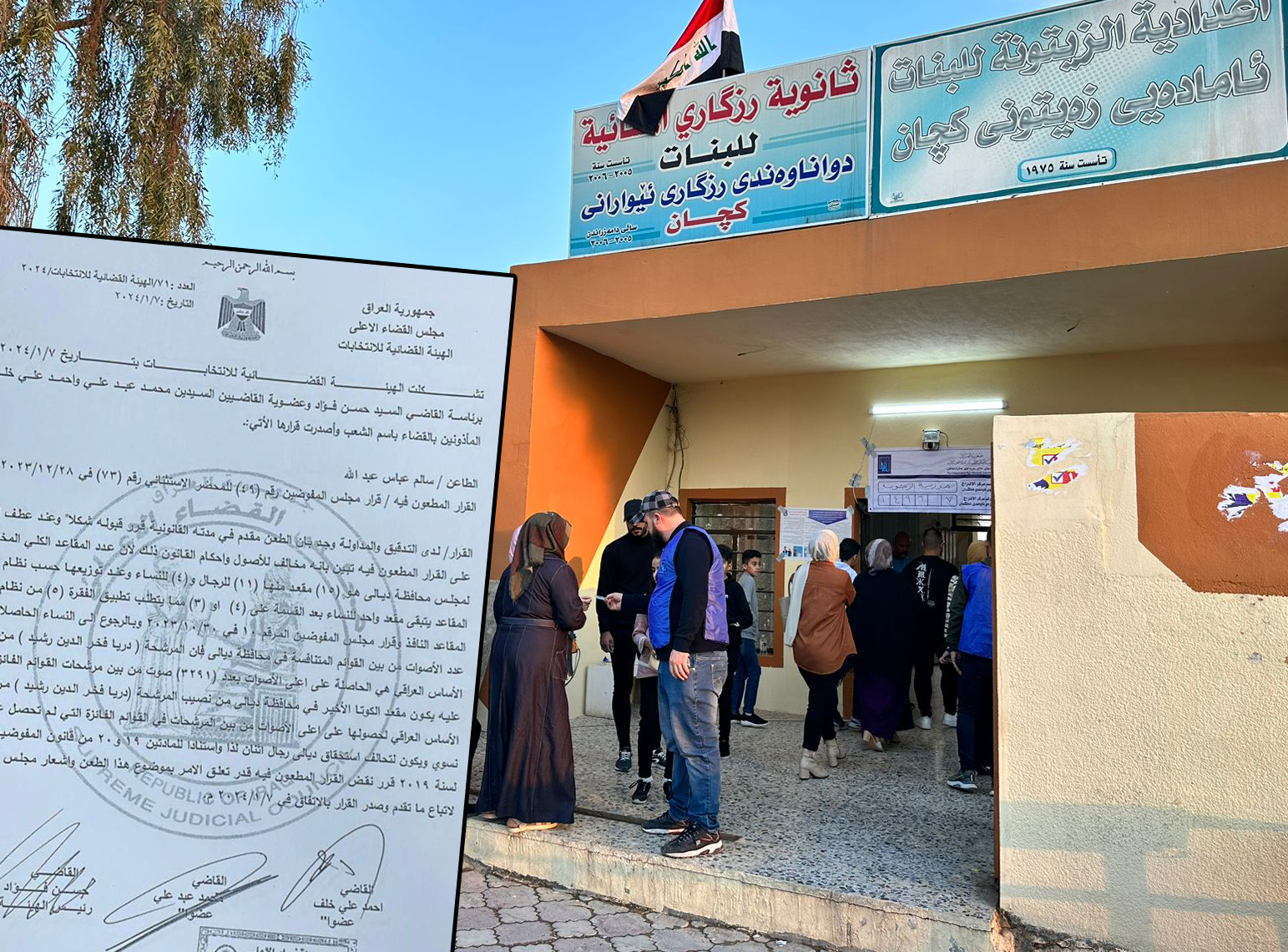Darya Khairallah Arkawazi became a member of the new Diyala Governorate Council based on the decision of the Judicial Commission for Elections after a change in the sequence of the quota for women.
The decision of the body affiliated with the Supreme Judicial Council was issued on January 7, 2024 based on a complaint from an electoral list candidate in Diyala in which he protested the allocation of his seat to a women’s quota. He regained his seat according to the decision, while the women’s quota seat was assigned to another list.
The commission’s decision, a copy of which was obtained by KirkukNow, stated, “The last quota seat in the Diyala Provincial Council goes to the candidate, Darya Khairallah Arkawazi, who received the highest votes with 3,291 votes.”
The Diyala Governorate Council consists of 15 seats, four of which are allocated to women.
Darya Khairallah, from the Kurdish community and from the Khanaqin district in Diyala, ran for the Iraqi Al-Asas (Base) list headed by the Deputy Speaker of the Iraqi Parliament, Mohsen Al-Mandalawi, a Shiite Kurd, and won a single seat in the provincial council.
The Al-Aasas Alliance seat will be given to the candidate, Darya Khairallah, instead of the candidate who won the seat, Sabah Zaini Al-Tamimi.
A source in the Diyala office of the Independent High Electoral Commission IHEC told (KirkukNow), “According to the decision, there was a change in the distribution of women’s quota seats.
Instead of Sabah Zaini Al-Tamimi from the Iraqi Basics list, Daria Khairallah will become a member of the council,” but the decision has not yet reached the final stage as it is likely to be appealed, according to the source.
Khanaqin District, home to 90,000 Kurds, Arabs and Turkmens, Sunnis and Shias, is part of Diyala province and is one of the disputed territories which extends from Khanaqin, on the border with Iran, to the northern oil-rich city of Kirkuk up to Shingal (Sinjar), home to the Ezidi community, in Mosul, in the far west, on Iraq-Syria borders.
Article 140 of the Iraqi constitution stipulates normalization, a population census and a referendum on the status of the territories, yet it has not been materialized up the preset, leaving the area in security gap, missing basic public services.
Most of the disputed territories were under control of the Kurdish Peshmerga forces up to October 2017, when the ISF took over control of these territories following the defeat of ISIS.

The results of the Iraqi provincial council elections, which were held on December 18, 2023, have not yet been approved, and if no changes occur to them, Khairallah will become the first member of the Kurdish component in the Diyala Provincial Council. She is a civil activist who represented the Diyala lecturers and was part of the body supervising a section of the lecturers’ demonstrations and protests.
The Kurdish parties in Diyala participated in the elections with 50 candidates within three lists, collecting about 37,000 votes, over 28,000 of which went to the Patriotic Union of Kurdistan PUK, which secured a seat for the candidate Aws Ibrahim Al-Mahdawi, who is from the Arab component, comes from the Sharban district (northeast of Diyala) and resides in Khanaqin, while the Kurds had three seats in the previous council.
Ali Hajiya, an election observer in Diyala, told KirkukNow, “It is possible that the decision will be appealed by Sabah Al-Tamimi, who lost his seat to Deraya Khairallah, so it is not yet clear whether other changes will affect the results or not, until the appeals are resolved by the Commission.”
The Kurds of Diyala are spread in the disputed territories of the Khanaqin district and its outskirts, where the population of these areas is estimated at 238,000 people, according to the statistics of the Central Bureau of Statistics for the year 2019, and the fate of these areas is linked administratively to the implementation of Article 140 of the Constitution to resolve its administration between the Iraqi federal government and the KRG.
The Election Commission announced in a statement on Wednesday, January 10, that it had received more than 80 decisions from the electoral judiciary and would inform those who appealed about them, without specifying any date for making changes and certifying the election results.
Women won 76 seats in the provincial councils, 17 of them without resorting to the quota system.





